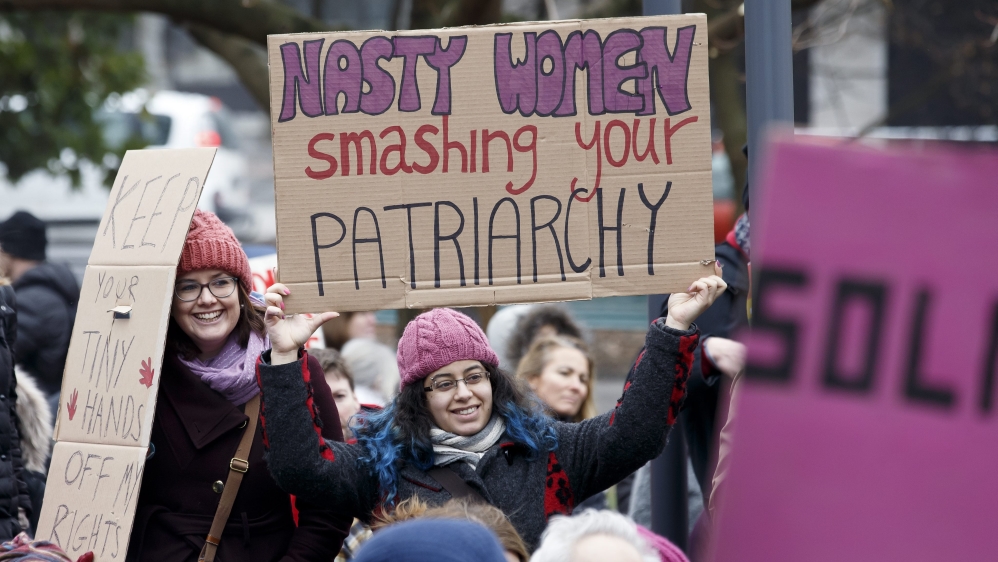Women poured into the US capital on Saturday to march in opposition to US President Donald Trump, while sister demonstrations took place in cities across Europe, Africa and Asia.
Saturday's protests came just a day after Trump, a right-wing Republican, took office.
In addition to Washington, DC, demonstrations against Trump's discriminatory rhetoric took place in Sydney, London, Berlin, Tokyo, Paris, Stockholm and elsewhere.
|
|
Trump has drawn the ire of liberals, leftists and other progressives for sexist comments and xenophobic language, while many abroad are worried over his inaugural vow on Friday to put "America First" in his decision-making.
The protests illustrated the depth of the anger in a deeply divided country that is still recovering from the scarring 2016 election campaign season.
Trump defeated Democrat Hillary Clinton, the first woman nominated for president by a major US party.
"It's important that our rights be respected. People have fought hard for our rights and President Trump has made it clear that he does not respect of them," said Lexi Milani, a 41-year-old restaurant owner from Baltimore, who had ridden down in a bus with 28 friends.
The Women's March on Washington featuring speakers, celebrity appearances and a protest walk along the National Mall, is the brainchild of Hawaiian grandmother Teresa Shook.
The march is intended as an outlet for women and their male allies to voice their opposition to Trump's victory.
Organisers said they expected hundreds of thousands of people to attend.
Lowest popularity rating
A disparate lineup of organisations including reproductive health provider Planned Parenthood, gun-control group Moms Demand Action and Emily's List, which promotes female candidates for office, sent large contingents to the event.
Many participants wore knitted pink cat-eared "pussy" hats, a reference to Trump's ostensible admission to having committed sexual assault in a 2005 video that was made public weeks before the election. In that video, he said that he grabbed women by the genitals without their consent.
The march spotlights the fierce opposition Trump faces as he takes office, a period that is typically more of a honeymoon for a new president.
A recent ABC News/Washington Post poll found Trump had the lowest popularity rating of any incoming president since the 1970s.
Women gave a host of reasons for marching, ranging from inspiring other women to run for office to protesting against Trump's plans to repeal the 2010 Affordable Care Act, which among other things requires health insurers to cover birth control.
Jesse Carlock, 68, a psychologist from Dayton, Ohio was attending her first protest in decades. "Once Mr Trump was elected, I decided I needed to get active again, and I hadn't been since the 60s and 70s," Carlock said.
"I've got to stand up and be counted as against a lot of what President Trump is saying ... about healthcare, immigration, reproductive rights, you name it."
Women said they hoped to send a unity message to Trump after a campaign in which he said Mexican immigrants were "rapists", discussed banning Muslims from entering the United States, and was revealed to have once bragged about grabbing women by the genitals and kissing them without permission.
Trump's team did not respond to a request for comment about the march.
Celebrities such as the musicians Janelle Monae and Katy Perry - both of whom supported Clinton in the election - are expected to take part in Saturday's march.
March organisers said they had extensive security plans in place, and would have both visible and hard-to-spot security workers along the route.
Global protests
Several thousand people gathered in central Stockholm to express support for women's rights and human rights, and in solidarity with the march in the US.
They marched to the US embassy, some carrying placards that read "Tiny hands off the nukes", "When they go low, we go high", and "Love not hate makes America great".
 |
| Women protest in Geneva, Switzerland [Salvatore Di Nolfi/EPA] |
Similar protests were held in the capitals of neighbouring Norway, Finland and Denmark.
Around 2,000 people marched in Vienna, according to estimates by the police and organisers, but sub-zero temperatures quickly thinned the crowd to a couple of hundred.
OPINION: Donald Trump's dangerous demagoguery
In Africa, hundreds of protesters in Nairobi's Karura Forest waved placards and sang American protest songs.
In Sydney, Australia's biggest city, about 3,000 people - men and women - gathered for a rally in Hyde Park before marching on the US consulate downtown, while organisers said 5,000 people rallied in Melbourne.
In New Zealand, there were marches in four cities, involving around 2,000 people, Wellington's march organiser Bette Flagler told Reuters.
Elsewhere in Asia, hundreds of people joined protests in Tokyo, including many American expatriates.
|
|
Source: News agencies

Comments